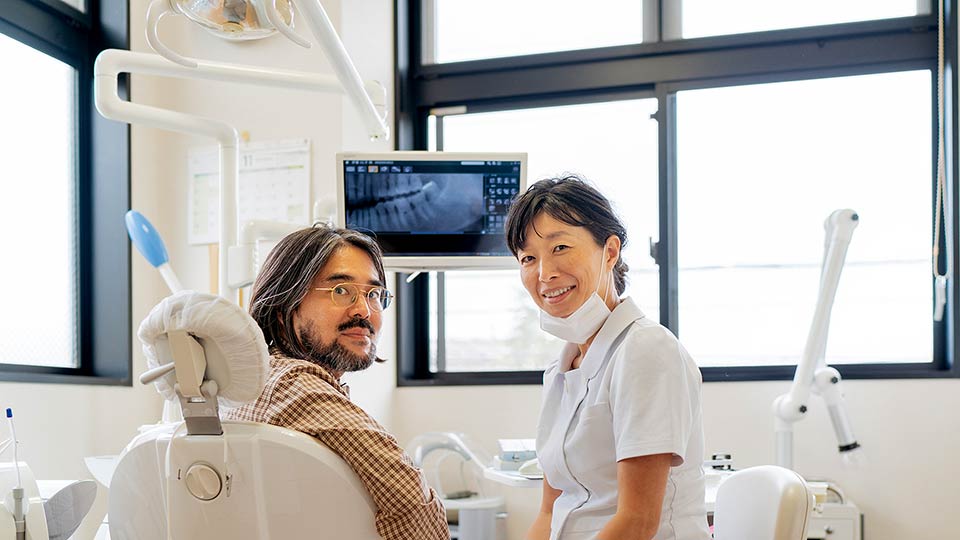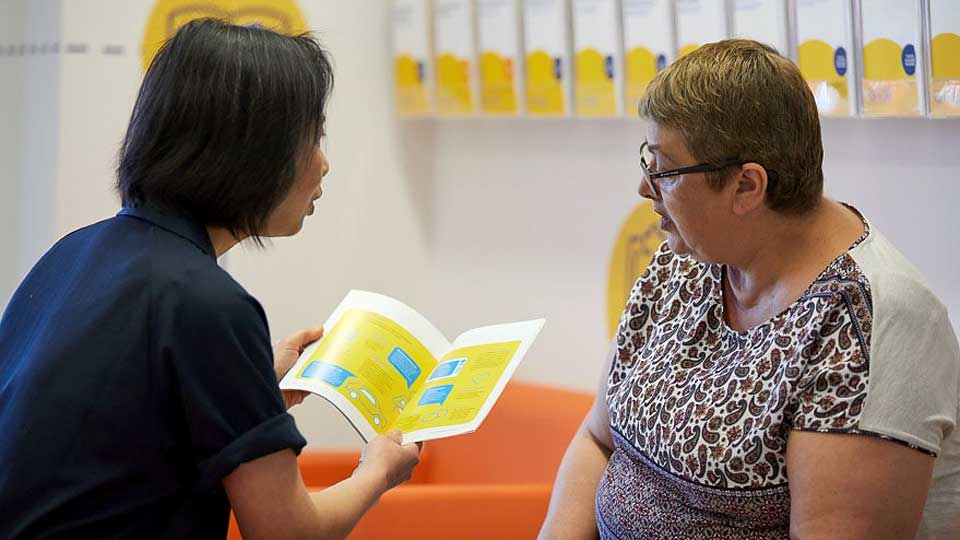Currently, specialists treating head and neck cancer cannot authorise chronic disease management plans. If I could change one thing about healthcare for head and neck cancer patients in Australia I would ask for the Medicare schedule to be amended so I could refer patients to subsidised dental and mental health support. These services exist, but currently only general practitioners have the authority to refer.
Unfair disadvantage
The separation of routine oral healthcare from Medicare disadvantages patients with head and neck cancer more than any other cancer patient. The side effects of initial cancer treatment typically require an escalation in dental care as patients grow older. Long term side effects, and the constant surveillance for recurrent or metastatic disease tied to extended and permanent survivorship, also drive the need for long term psycho-oncology support.
Cancer survivorship phases
- Acute survivorship – starts at diagnosis and goes through to the end of initial treatment. Cancer treatment is the focus.
- Extended survivorship – starts at the end of initial treatment and goes through the months after. The effects of cancer and treatment are the focus.
- Permanent or long term survivorship – is when years have passed since cancer treatment ended. There is less of a chance that the cancer may come back. Long-term effects of cancer and treatment are the focus.
Definitions
General Practitioner (GP) – a primary care physician.
General Practitioner Management Plan (GPMP) – For patients with a chronic or terminal condition, a care plan may be developed with your GP. Patients requiring complex care can be referred for up to five individual services per calendar year. These services may include psychologists, speech pathologists, physiotherapists and dietitians, but not dentists.
Team Care Arrangement (TCA) – The team care arrangement is typically a multidisciplinary extension of the GPMP. TCAs require GPs to collaborate with at least two other health or care providers. I am often included in these plans but cannot initiate them. Eligible health providers include psychologists, speech pathologists, and dietitians, but excludes dentists.
Referral for Dental Services under Medicare – To be eligible for this service patients must have a GPMP or TCA in place. Only their general practitioner can refer.
Public Dental Services – Government funded dental schemes. These are usually located in public hospitals and community health centres and vary from state to state.
Oral Health Fee for Service Scheme (OHFFSS) – allows public dental services in NSW to outsource treatment to private dental practitioners using an OHFFSS voucher.
Special Needs Dentistry (SND) – The branch of dentistry concerned with the oral healthcare of people that require special methods or techniques to prevent or treat oral health problems, or where their conditions necessitate special dental treatment plans.
Psycho-oncology – Provides support to individuals, families and carers across the cancer journey, including diagnosis, during treatment, transitioning to and throughout survivorship, and approaching the end-of-life. These services can be provided by a range of appropriately trained individuals, including psychologists, social workers and nurses.
Obstacles for patients
Side effects of cancer treatment are often long-term
Aggressive treatment of malignant disease may produce unavoidable toxicities to normal, healthy cells. The mouth is highly susceptible to direct and indirect effects of chemotherapy and radiation. An example of this is mucositis.
It is not only head and neck cancer patients who suffer. Patients on a range of medications for other diseases can experience their saliva drying up significantly. In some cases, to the point where there’s no saliva flow at all. In that situation, even a person with good healthy teeth can go from intact teeth to no teeth in under two years.
Access to free dental is very limited
Access to free dental treatment in Australia varies from state to state. Where I practice in New South Wales, patients with a Health Care Card, Pension Concession Card issued by Centrelink, Commonwealth Seniors Health Card, or Pensioner Concession Card issued by the Department of Veterans’ Affairs, are eligible for publicly funded dental care.
But a shortage of funding for public dentists, and subsidisation of private dentists, creates long waiting periods. I am repeatedly saddened by disparities in access to dental care and the significant disadvantages this causes effected patients. Having no regular dentist or general practitioner, or having to wait months or years to access public dental services, can have extremely debilitating consequences.
Some patients can afford treatment with private dentists, but ongoing care is very expensive, even if they have private health insurance. Plus there is a shortage of dentists who have experience with treating head and neck cancer patients.
The impact of dentition on nutrition and outcomes
A lack of exposure to the long-term care of head and neck cancer patients during training often results in dentists providing advice to head and neck cancer patients without consulting members of the cancer treatment team. Some private dentists call me for advice, others do not. I find it hugely frustrating when I see a patient for follow up and discover all their teeth have been removed by a dentist who made no effort to contact me to discuss the patient’s care. Sometimes a patient is left waiting a minimum of twelve months for a set of publicly funded dentures, a delay which compromises their nutrition and recovery from cancer treatment, as well their remaining dental health. This can also impact on a patient’s sense of well-being and confidence to socialise.
Government funding does not match policies
I am not alone in calling for expanded Medicare-funded dental care in Australia. A 2019 report, from Stephen Duckett of the Grattan Institute, said Australia’s current approach to oral health was an “inequitable, ramshackle scheme”. The Australian Dental Association and the Consumers Health Forum of Australia support this view, and I join them in demanding reform and prioritising Australian’s oral health at the next federal election.
Obstacles for medical specialists who treat head and neck cancer
My ability to provide long term care to patients is frustrated by several key concerns:
- No authority to refer a patient for Medicare subsidised dental or mental health treatment plans.
- Not all patients having a regular GP.
- A shortage of public dentists.
- A shortage of special needs dentists with appropriate training and experience in caring for head and neck cancer patients.
- A poor history of exchanging medical records between private dentists and members of Head and Neck Cancer Multidisciplinary Teams.
Exclusion of dental records from My Health Record demonstrates the communication issues that can arise between medical practitioners and dentists who are not part of a common record sharing practice. This problem is repeated when dentists are referred patients as part of a GPMP as they typically only correspond with the referring general practitioner once treatment has been completed.
Initiatives within my own practice
All my head and neck cancer patients, both public and private, are assessed by a consultant dentist at our weekly Head and Neck Cancer Multidisciplinary Team (MDT) meeting prior to commencing treatment. In my private practice, I am trying to improve communication with private dentists by including them in correspondence which is also sent to a patient’s GP. This includes designing my patient details form to collect dentist contact information at the first consultation, as well as sending them hospital discharge summaries prepared by my Nurse Practitioner.
Prior to surgery time is of the essence
In an ideal world there would be time to exchange information with private dentists before a patient starts treatment for head and neck cancer surgery, but this is not always possible. If pre-surgical extraction is required there is not always time to refer a patient to their private dentist before their surgery. Head and neck cancer is extremely aggressive. The faster treatment starts, the better the chance of an optimal outcome.
Access to psycho-oncology services
Psycho-oncologists provide a hugely important service to head and neck cancer patients. Fortunately their numbers are increasing and telehealth has improved access for regional patients. Finance remains a barrier for concession card holders and private patients. If specialists like me could authorise chronic disease management plans we could help reduce the financial burden for patients by providing access to subsidised care.
There are some fantastic providers out there
I cannot write on this topic without making special mention of a number of dental specialists and psycho-oncologists who champion the needs of head and neck cancer patients. I am extremely grateful to my colleague, St Vincent’s consultant dentist, Dr Peter Foltyn, and legends of NSW public health, maxillofacial prosthodontists Jim and Nanette Fisher of Sydney Dental Hospital. I also want to acknowledge Special Needs Dentist A/Prof Sharon Liberali, Health Psychologist DA/Prof Haryana Dhillon, psycho-oncology Social Worker Teresa Simpson, and the fantastic allied health team at St Vincent’s Sydney for their ongoing efforts to improve the lives of head and neck cancer patients beyond acute treatment.
Resources for patients
Innovations in Dental Care –2020 Head & Neck Cancer Video Series
Innovations in Managing Distress & Recovery – 2020 Head & Neck Cancer Video Series
Patient Guide on Survivorship created by European Society for Medical Oncology (ESMO) and European Cancer Patient Coalition (ECPC) in collaboration with International Psycho-Oncology Society (IPOS).
Head and Neck Cancer Australia




